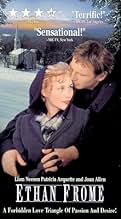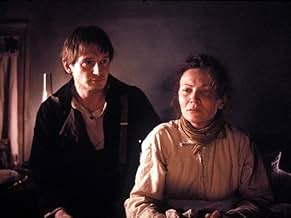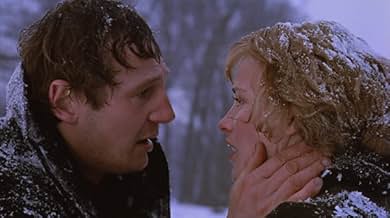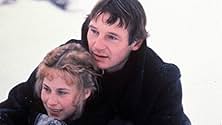IMDb RATING
6.3/10
2.4K
YOUR RATING
A new pastor arrives in a stark Vermont village and is intrigued by crippled, misshapen Ethan Frome living on an isolated, hardscrabble farm with his sickly wife Zeena.A new pastor arrives in a stark Vermont village and is intrigued by crippled, misshapen Ethan Frome living on an isolated, hardscrabble farm with his sickly wife Zeena.A new pastor arrives in a stark Vermont village and is intrigued by crippled, misshapen Ethan Frome living on an isolated, hardscrabble farm with his sickly wife Zeena.
- Director
- Writers
- All cast & crew
- Production, box office & more at IMDbPro
Featured reviews
8rodw
The photography is one of the best aspects of the film. The depressing snow and freezing temperature really come across well. The acting is good. In particular, Joan Allen shines as the sickly wife and Liam Neeson is very sympathetic as Ethan. The essential weaknesses of plot derive more from the novella than the director; the theme is not that relevant for modern audiences and some of the criticism levelled against it is undeserved. The plot is faithful to the original although one character is changed from an engineer to a clergyman. The poverty of the town is very well illustrated and gives an alternative view to some Victorian set films.
Liam Neeson is astounding. The rest of the cast is very good as well. Though poor Joan Allen has the misfortune of being required to grate on the nerves. Tate Donovan was a nice find as well, as the new preacher in town, I think I enjoyed him more here than in any other film in which I've seen him.
Back, however, to Neeson. From the opening moments when you see him trudging through the snow to the sexual energy he exudes without showing skin to the final moments of deep pain and confusion, he is is phenomenal. He is THE reason to see this film.
It could have been that I was home ill (ironic when you consider the plot) when I saw the film, but I'm not so sure the pace wasn't a little below the speed necessary for people to get truly wrapped into the story and characters. Yet, I stuck through the whole thing, because I was transfixed by Neeson's performance.
He is one of the greats! I always feel warmed after watching him perform.
Back, however, to Neeson. From the opening moments when you see him trudging through the snow to the sexual energy he exudes without showing skin to the final moments of deep pain and confusion, he is is phenomenal. He is THE reason to see this film.
It could have been that I was home ill (ironic when you consider the plot) when I saw the film, but I'm not so sure the pace wasn't a little below the speed necessary for people to get truly wrapped into the story and characters. Yet, I stuck through the whole thing, because I was transfixed by Neeson's performance.
He is one of the greats! I always feel warmed after watching him perform.
Ethan Frome is one of those stories that is meant to be uncomfortable and unattractive, so if you were put off by either the novel or the movie, it just shows that they succeeded in what they set out to do. Personally, I am slightly ashamed to admit that the novel bored me nearly to tears, but this film version not only refreshed the story in my memory but also breathed a much needed bit of life into the literary version, which is something that I rarely say about a film version of a novel. Before I go on, however, I would like to point out that I realize how much is lost in the transition from novel to film, in that the film is not able to capture Wharton's writing style and there are scenes that are taken out and artistic liberties taken with the material, but as far as a structured story, this is a worthwhile adaptation.
Liam Neeson brilliantly portrays the fated Ethan Frome, a character who is in an unhappy marriage to a wife who is more interested in the social status achieved by being married than in Ethan as a person. Zeena, his wife (played by Joan Allen), is a woman who has become embittered by her life as the wife of a poor man (as Ethan describes her at one point) and the fact that any scrap of love or passion has leaked completely out of her marriage, which was pretty dry to begin with. When Mattie (Patricia Arquette) comes to live with them, things begin to fall apart much more seriously than the emotional way in which the marriage between Ethan and Zeena has long since crumbled.
There are a lot of religious and social undertones throughout the film, as we struggle with Ethan and Mattie, watching them desperately falling in love with each other but each as helpless to do anything about it as the other. Ethan can't leave Zeena for religious reasons, and social reasons as well, since he will be disrespected by the community if he does that (which is a little strange, since you would think there would be even more disapproval from the fact that Ethan and Zeena are distant cousins). And besides that, Ethan has moral reasons of his own for not wanting to leave Zeena, feeling that he has an obligation to her that prevents him from leaving her alone and helpless. This obligation is, of course, derived mainly from Zeena having put so much effort into caring for Ethan's mother before she passed away, an extended act of charity of which she constantly reminds him.
Patricia Arquette delivers a fine performance in the role as Mattie Silver, although her iconography since making this film has completely changed the way she is seen in movies and makes her role as Mattie slightly less believable. But Liam Neeson is the actor here who deserves the most recognition, I can't even imagine someone portraying Ethan Frome more accurately as far as the way he was described in the book than what Neeson did in this film. If you're studying this book in school, it would probably be a good idea to just go ahead and read the book, because this movie is not going to inform you enough to be able to pass a test on the novel, but it certainly works as far as entertainment or as a way to complement the book.
Liam Neeson brilliantly portrays the fated Ethan Frome, a character who is in an unhappy marriage to a wife who is more interested in the social status achieved by being married than in Ethan as a person. Zeena, his wife (played by Joan Allen), is a woman who has become embittered by her life as the wife of a poor man (as Ethan describes her at one point) and the fact that any scrap of love or passion has leaked completely out of her marriage, which was pretty dry to begin with. When Mattie (Patricia Arquette) comes to live with them, things begin to fall apart much more seriously than the emotional way in which the marriage between Ethan and Zeena has long since crumbled.
There are a lot of religious and social undertones throughout the film, as we struggle with Ethan and Mattie, watching them desperately falling in love with each other but each as helpless to do anything about it as the other. Ethan can't leave Zeena for religious reasons, and social reasons as well, since he will be disrespected by the community if he does that (which is a little strange, since you would think there would be even more disapproval from the fact that Ethan and Zeena are distant cousins). And besides that, Ethan has moral reasons of his own for not wanting to leave Zeena, feeling that he has an obligation to her that prevents him from leaving her alone and helpless. This obligation is, of course, derived mainly from Zeena having put so much effort into caring for Ethan's mother before she passed away, an extended act of charity of which she constantly reminds him.
Patricia Arquette delivers a fine performance in the role as Mattie Silver, although her iconography since making this film has completely changed the way she is seen in movies and makes her role as Mattie slightly less believable. But Liam Neeson is the actor here who deserves the most recognition, I can't even imagine someone portraying Ethan Frome more accurately as far as the way he was described in the book than what Neeson did in this film. If you're studying this book in school, it would probably be a good idea to just go ahead and read the book, because this movie is not going to inform you enough to be able to pass a test on the novel, but it certainly works as far as entertainment or as a way to complement the book.
I watched this movie yesterday night. It made me cry! Then I dreamed of it at night, and when I woke up I still had a melancholy feeling in my stomach and a sweet pain in my heart. Very few movies or novels affect me this strongly nowadays!
The depiction is bleak but romantic, tender, and very, very fine. The actors are all very good in their parts. This is one of those love stories that make you take the side of the adulterous couple, however much you are against such behaviour in ordinary cases. Mutual love can be so hard to find, and when you find it but cannot have it because of circumstances in the world around, you "never want to leave this hill"...
The depiction is bleak but romantic, tender, and very, very fine. The actors are all very good in their parts. This is one of those love stories that make you take the side of the adulterous couple, however much you are against such behaviour in ordinary cases. Mutual love can be so hard to find, and when you find it but cannot have it because of circumstances in the world around, you "never want to leave this hill"...
Ethan Frome (1993)
This is a classic Edith Wharton melodrama, a hyper-romantic short novel that has turned on and turned off many high schoolers and literature majors over the years. It's a great story and it's hard to go totally wrong with it, but it's an old fashioned story, and more slow and steady than filled with amazing or surprising turns and emotional insights.
Another way to put it is: it isn't a Bronte novel.
So a movie version of Ethan Frome has to find some way of pulling us in very deeply, through characterization, through ambiance, through an attention so small things that make the main plot take on resonance. None of that quite happens here.
The photography makes clear from the first scenes that it is very careful, which isn't a bad thing. The whole film has a steady, beautiful, somewhat constrained quality, using lots of available light. We watch the title character, played by Liam Neeson, with a growing sense of calm partly because of the camera. When we discover the relationship between Frome and his wife, and then with his wife's relative who has come to "help" them with chores, it is always bordering on stiff. I think this is meant to imply a formality to life at the turn of the century (the book was written in 1911 and set a few years earlier). But to my mind people were not so poised, or afraid, or following puritanical strictures as all that.
At any rate, the move ends up weirdly flat as a result. We know the events are romantically intense, but we don't get swept away by them. It's surprising no movie version has been attempted before this one. And it will be surprising if another is tried, hopefully with more effect. This isn't at all bad, nothing glaring here, but being "not bad" isn't quite the idea in the end.
This is a classic Edith Wharton melodrama, a hyper-romantic short novel that has turned on and turned off many high schoolers and literature majors over the years. It's a great story and it's hard to go totally wrong with it, but it's an old fashioned story, and more slow and steady than filled with amazing or surprising turns and emotional insights.
Another way to put it is: it isn't a Bronte novel.
So a movie version of Ethan Frome has to find some way of pulling us in very deeply, through characterization, through ambiance, through an attention so small things that make the main plot take on resonance. None of that quite happens here.
The photography makes clear from the first scenes that it is very careful, which isn't a bad thing. The whole film has a steady, beautiful, somewhat constrained quality, using lots of available light. We watch the title character, played by Liam Neeson, with a growing sense of calm partly because of the camera. When we discover the relationship between Frome and his wife, and then with his wife's relative who has come to "help" them with chores, it is always bordering on stiff. I think this is meant to imply a formality to life at the turn of the century (the book was written in 1911 and set a few years earlier). But to my mind people were not so poised, or afraid, or following puritanical strictures as all that.
At any rate, the move ends up weirdly flat as a result. We know the events are romantically intense, but we don't get swept away by them. It's surprising no movie version has been attempted before this one. And it will be surprising if another is tried, hopefully with more effect. This isn't at all bad, nothing glaring here, but being "not bad" isn't quite the idea in the end.
Did you know
- TriviaIn Edith Wharton's original novel, the stranger in town who takes an interest in Ethan is not a new pastor, but a businessman or woman (the gender isn't specified) temporarily staying in the area.
- GoofsIn a winter scene early in the film, a Red-eyed Vireo can be heard singing in the dead of winter in Massachusetts. These birds winter in Amazonia, and arrive in Massachusetts in late spring.
- Quotes
Mattie Silver: If I miss my train, where will I go?
Ethan Frome: Where will you go if you catch it?
- ConnectionsFeatured in Screen Two: Ethan Frome (1994)
- SoundtracksTurkey in the Straw
(uncredited)
American folk tune
[Played at square dance]
- How long is Ethan Frome?Powered by Alexa
Details
- Release date
- Countries of origin
- Official site
- Language
- Also known as
- American Playhouse: Ethan Frome
- Filming locations
- Production companies
- See more company credits at IMDbPro
Box office
- Budget
- $3,000,000 (estimated)
- Gross US & Canada
- $296,081
- Opening weekend US & Canada
- $57,623
- Mar 14, 1993
- Gross worldwide
- $296,081
- Runtime
- 1h 39m(99 min)
- Color
- Sound mix
- Aspect ratio
- 1.85 : 1
Contribute to this page
Suggest an edit or add missing content















